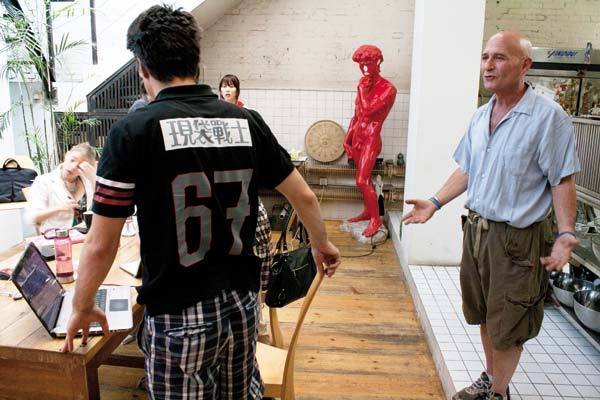Incubator of art
Updated: 2012-07-23 13:08
By Darnell Gardner Jr. (China Daily)
|
|||||||||||
 |
|
David Kay (right) rents the remains of an abandoned electronics factory and turns it into a creators' loft in Beijing's 798 Art Zone. |
A veteran laywer takes his fate in his own hands and turns to the world of arts, Darnell Gardner Jr. reports.
After 20 years as an intellectual-property lawyer, David Kay decided to take his life in a more creative direction. Kay is the chairman and founder of Yuanfen Flow, an art gallery and what he calls an "incubator", a place for entrepreneurs to formulate sustainable creative business ventures.
This new project was built upon the skills, knowledge and contacts he acquired as a student of Chinese, a lawyer and a technology enthusiast.
Kay, a native of Colorado, attributes his love for China to a bit of serendipity.
While browsing the stacks in a library in Colorado for information on ceramics, two books on a top shelf caught his eye.
"I brought them down just because they were pretty," he says. "One would expect that two books with the same title would have the same content inside, but although they were both in English, and the words were totally different."
The books were two translations of The I Ching, or Classic of Changes, a classic work of Chinese literature. Kay, who had just failed a French exam, says he was drawn to the flexibility one can exercise when interpreting Chinese.
"If you can translate it this way or that way and they're both OK, then that's my kind of language."
He immediately enrolled in Chinese classes at Denver University. His interest in Chinese carried him east to Brown University, where he graduated with a degree in Chinese, and further east still to Taiwan for additional studies.
Upon returning to the United States, Kay ached for change.
"I wanted to learn a new language, and that was business," he says.
He went on to learn this new language at Thunderbird University of Global Management, where he earned an MBA and also helped found the school's first exchange with the Chinese mainland.
Then he studied law, and eventually found himself working as a lawyer in Beijing.
"Naturally, I started collecting an interesting selection of clients," he says. "They were all sort of high-tech clients, and one of them was Microsoft."
Microsoft China made him their general counsel in 2003. Halfway through his tenure as general counsel, he became Microsoft China's "piracy czar".
"We had a 95-percent usage rate of our operating system, which was great, but unfortunately no one was buying it," Kay says.
Kay worked to change the perception of owning authentic Microsoft products, particularly the Windows operating system. Kay says the key for Microsoft was to focus not on the software itself, but on how customers thought of it.
"You sell security, you don't sell software," he says. "You sell a safe experience."
Kay says after the disappointing release of Windows Vista, he began to feel it might be time to move on to something else.
He discovered Beijing's 798 Arts Zone in 2003, when it was just beginning to emerge as an enclave for Beijing's creatives. He rented the remains of an abandoned electronics factory and began transforming it into a loft.
"I could put in all cool design ideas because I had the space," he says. "I could raise a baby elephant in here."
Five years later, he opened a new media art gallery in his loft, but he still felt something was missing. He says that of the dozens of artists he worked with, he noticed none was able to live off their creativity. He wanted to change that.
"A lot of what was missing was sustainability for the artists," he says.
Kay remembered a rejected business proposal he had devised while at Microsoft for what he called a "creativity incubator".
He says his new company, Yuanfen Flow, blends practicality and creativity. His staff contains lawyers, philosophers, and architects in addition to artists specializing in a variety of mediums.
"I've been in the corporate law world, the high-tech side of things, and I've been an art gallery director," he says. "Those are all very different skill sets, but it also allowed me to build an interesting network of friends and resources that can generally help."
Kay says he knew the old factory was special when he noticed a potter's wheel that had been left behind by the previous owner.
"I started studying Chinese because of ceramics," he says. "Thirty years later, I'm in the middle of Beijing in a German-built electronics factory, and I find a potter's wheel inside. Something in the universe must have brought me to this particular factory."
Contact the writer at sundayed@chinadaily.com.cn.
Related Stories
Art in paddy field 2012-07-22 11:16
Purposeful art 2012-07-20 16:13
Art beat: Art 2012-07-20 13:57
791 art zone opened in Nanchang 2012-07-11 15:20
Art hacking 2012-06-15 13:38
Today's Top News
Rescuers race against time for quake victims
Telecom workers restore links
Coal mine blast kills 18 in Jilin
Intl scholarship puts China on the map
More bird flu patients discharged
Gold loses sheen, but still a safe bet
US 'turns blind eye to human rights'
Telecom workers restore links
Hot Topics
Lunar probe , China growth forecasts, Emission rules get tougher, China seen through 'colored lens', International board,
Editor's Picks

|

|

|

|

|

|





